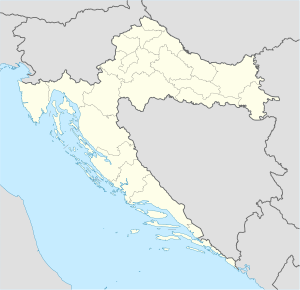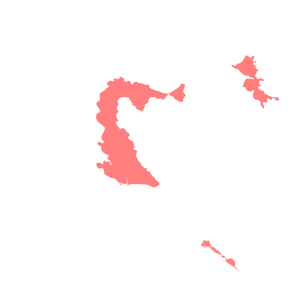
Back حصار كييفو (1991) Arabic Asedio de Kijevo en 1991 Spanish Kijevo ostroma Hungarian 키예보 포위전 Korean Осада Кийево Russian Cuộc vây hãm Kijevo năm 1991 Vietnamese
| Siege of Kijevo | |||||||
|---|---|---|---|---|---|---|---|
| Part of the Croatian War of Independence | |||||||
The location of Kijevo within Croatia. Areas controlled by the JNA in late December 1991 are highlighted in red. | |||||||
| |||||||
| Belligerents | |||||||
|
|
| ||||||
| Commanders and leaders | |||||||
|
|
| ||||||
| Units involved | |||||||
|
|
| ||||||
| Strength | |||||||
| unknown | 58 policemen | ||||||
| Casualties and losses | |||||||
| None |
20 captured 2 wounded | ||||||
The 1991 siege of Kijevo was one of the earliest clashes of the Croatian War of Independence. The 9th Corps of the Yugoslav People's Army (JNA) led by Colonel Ratko Mladić and the forces of the Serbian Autonomous Oblast (region) of Krajina (SAO Krajina) under Knin police chief Milan Martić besieged the Croat-inhabited village of Kijevo in late April and early May 1991. The initial siege was lifted after negotiations that followed major protests in Split against the JNA.
The JNA and the SAO Krajina forces renewed the blockade in mid-August. Kijevo was captured on 26 August, and subsequently looted and burned. The fighting in Kijevo was significant as one of the first instances when the JNA openly sided with the SAO Krajina against Croatian authorities. The Croatian police fled Kijevo towards the town of Drniš and the remaining Croatian population left the village.
Martić was tried at the International Criminal Tribunal for the former Yugoslavia (ICTY) on several different charges of war crimes including, his involvement in the siege of Kijevo. The trial resulted in a guilty verdict, and the findings of the Trial Chamber regarding Kijevo, made in 2007, were confirmed by the ICTY Appeals Chamber in 2008, based on witness testimonies about it being ethnic cleansing. The siege was the first instance of use of the ethnic cleansing in the Yugoslav Wars. Croatian authorities tried Mladić in absentia and convicted him for war crimes committed in Kijevo.
© MMXXIII Rich X Search. We shall prevail. All rights reserved. Rich X Search

